Search the Special Collections and Archives Portal
Search Results
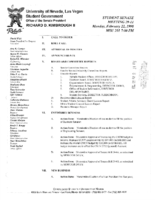
Meeting minutes for Consolidated Student Senate University of Nevada, Las Vegas, February 22, 1999
Date
1999-02-22
Archival Collection
Description
Includes meeting agenda and minutes, along with additional information about funding resolutions and money allotment. CSUN Session 29 Meeting Minutes and Agendas.
Text

Meeting minutes for Consolidated Student Senate University of Nevada, Las Vegas, November 25, 1996
Date
1996-11-25
Archival Collection
Description
Includes meeting agenda and minutes, along with additional information about senate rules and bills.
Text
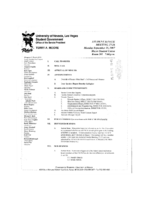
Meeting minutes for Consolidated Student Senate University of Nevada, Las Vegas, September 15, 1997
Date
1997-09-15
Archival Collection
Description
Includes meeting agenda and minutes, along with additional information about proposals.
Text
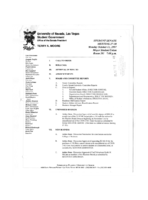
Meeting minutes for Consolidated Student Senate University of Nevada, Las Vegas, October 13, 1997
Date
1997-10-13
Archival Collection
Description
Includes meeting agenda, minutes, bills, and a sentimental agenda.
Text
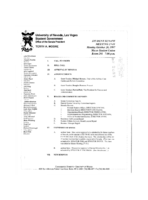
Meeting minutes for Consolidated Student Senate University of Nevada, Las Vegas, October 20, 1997
Date
1997-10-20
Archival Collection
Description
Includes meeting agenda and minutes, along with additional information about sentimental agendas, bylaws, and final draft reports.
Text

Meeting minutes for Consolidated Student Senate University of Nevada, Las Vegas, April 24, 1995
Date
1995-04-24
Archival Collection
Description
Includes meeting agenda and minutes, along with additional information about CSUN business manager audit and memorandum.
Text

Meeting minutes for Consolidated Student Senate University of Nevada, Las Vegas, September 06, 1995
Date
1995-09-06
Archival Collection
Description
Includes meeting agenda and minutes, along with additional information about performance contracts and university addendum.
Text
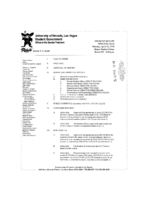
Meeting minutes for Consolidated Student Senate University of Nevada, Las Vegas, April 22, 1996
Date
1996-04-22
Archival Collection
Description
Includes meeting agenda and minutes, along with additional information about requests, bylaws, and resolutions.
Text
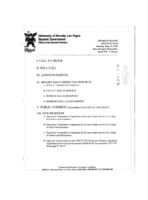
Meeting minutes for Consolidated Student Senate University of Nevada, Las Vegas, May 13, 1996
Date
1996-05-13
Archival Collection
Description
Includes meeting agenda and minutes.
Text
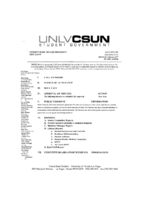
Meeting minutes for Consolidated Student Senate, University of Nevada, Las Vegas, February 25, 2008
Date
2008-02-25
Archival Collection
Description
Includes meeting agenda, along with additional information about resolutions, bills, and bylaws.
Text
Pagination
Refine my results
Content Type
Creator or Contributor
Subject
Archival Collection
Digital Project
Resource Type
Year
Material Type
Place
Language
Records Classification
